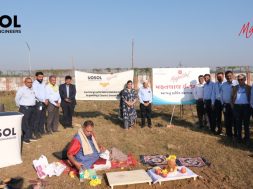
IEA convenes 2019 meeting of the Renewable Industry Advisory Board
The IEA convened the 2019 meeting of the Renewable Industry Advisory Board (RIAB) on 2 April, focusing on innovation and policies to scale up sustainable bioenergy deployment.
The meeting brought together fifty senior representatives from companies active in the bioenergy sector, industry associations, research organisations, representatives from the Biofuture Platform and other policy makers. Covering a wide geographical scope from across Europe, Brazil, India and the United States. Senior management from across the IEA was also in attendance, demonstrating the importance of bioenergy across the breath of the energy system.
IEA modelling indicates that modern bioenergy must make a key contribution if global climate change commitments are to be met. As outlined in IEA Executive Director Faith Birol’s opening remarks “there is no credible long-term low carbon energy scenario without a much expanded contribution from sustainable bioenergy.”
Achieving this scale up will require innovation to commercialise new technologies and fuels. Companies at the forefront of the bioenergy industry showcased a wide range of such cutting edge developments. These included:
- Biorefining to produce renewable fuels, energy and products from biomass feedstocks.
- Bioenergy carbon capture and storage (BECCs) development at a large scale power station.
- Production of fuel ethanol from agricultural residues and waste gas streams.
- New boiler designs with the flexibility to use a range of biomass and waste fuels in industry.
However, the path from innovation to commercialisation will not happen without effective policy mechanisms to address market barriers, attract investment and ensure bioenergy is sustainable.
The meeting heard the positive results from California’s Low Carbon Fuel Standard policy. A fuel neutral and market based approach that has facilitated almost $3 billion of investment in low carbon fuels. An overview of Renovabio, a similar policy due to commence in Brazil next year, was also given. Alongside an explanation of how carbon taxation resulted in a significant scale up of bioenergy in Sweden.
Participants highlighted that a stable policy environment is essential to ensure innovative bioenergy technologies can access finance. And that policy support should be broad enough to encourage a basket of potential technologies and fuels, as being too prescriptive can overlook future innovative solutions.
It was also considered that there is a role for flexible policies that can facilitate development of immature technologies with considerable long term promise, and that differing regional and national priorities need to be taken into account.
The meeting concluded by suggesting that clear sustainability governance frameworks based on internationally aligned principles are needed, and that these will be a likely prerequisite to leverage green finance.
The IEA will utilise these insights to support its wide ranging work on bioenergy. Which covers market analysis, long term modelling and policy dialogue with member and association countries, and beyond.
The IEA is active in the bioenergy field. Our recent Renewables 2018 market report explored the role of modern bioenergy across the whole energy system, while in 2017 we published a Technology Roadmap on Delivering Sustainable Bioenergy over the long-term. The IEA also acts as the Facilitator body for the twenty-country Biofuture Platform.














